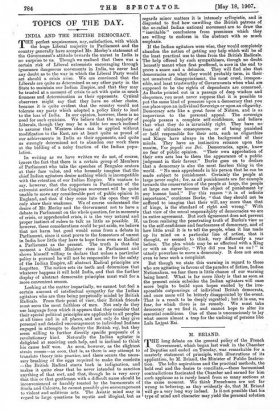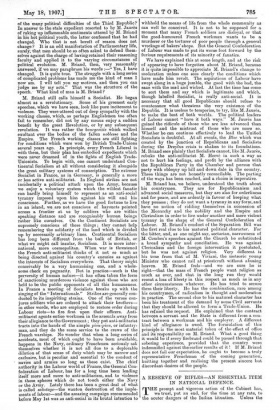M. BRLA_ND.
THE long debate on the general policy of the French Government, which began last week in the Chamber , of Deputies and ended on Tuesday, was remarkable for a masterly statement of principle, with illustrations of its application, by M. Briand, the Minister of Public Instruction. The lofty aspirations and the practical methods, the bold zeal and the desire to conciliate,—these harmonised contradictions fascinated the Chamber and earned for him such applause as is rarely heard from so many sections at the same moment. We think Frenchmen are not far wrong in believing, as they evidently do, that M. Briand will go a very long way indeed. Is it not possible that his • type of mind and character may yield the personal solution
of the many political difficulties of the Third Republic? In answer to the Stale expedient resorted to by M. Saures of rakingup inflammable sentiments uttered by M. Briand in his hot political youth, the latter confessed that he had changed. Who that is not bereft of reason does not change ? It is an odd manifestation of Parliamentary life, surely; that men should be so often asked to defend themselves against the charge of having retained their reasoning faculty and applied it to the varying circumstances of political evolution. M. Briand, then, very reasonably answered, if we may paraphrase his words :—" Yes, I have changed. It is quite true. The struggle with a long series of complicated problems has made me the kind of man I now "am. I will tell you my motives, and then you can judge me by my acts." That was the structure of the speech.' What kind of man is M. Briaud ?
M. Briand still calla himself a Socialist. He began almost as a revolutionary. Some of his greenest early speeches, which we have seen, look like pure incitement to violence. They were uttered out of deep sympathy with the working classes, which, as perhaps Englishmen too often fail to remember, did not by any means enjoy a sudden benefit by the great Revolution, or by any subsequent revolution. It was rather the bourgeoisie which walked exultant over the bodies of the fallen noblesse and the Empire. The French working classes are still fighting for conditions which were won by British Trade-Unions several years ago. In principle, every French Liberal is with them, but their plan has embodied expedients which were never dreamed of in the fights of English Trade. Unionists. To begin with, one cannot understand Continental Socialism at all without considering it alongside the great military systems of conscription. The extreme Socialist in France, as in Germany, is generally a more or less active anti-militarist. In England strikes are not incidentally a political attack upon the Army, because we enjoy a voluntary system which the wildest fanatic can hardly bring himself to represent as an anti-social tyranny imposed upon him against his will and his conscience. Further, as we have the good fortune to live in an island, we are not conscious of bayonets pointed across a fiontier at us by soldiers who are within speaking distance and are recognisably human beings rather like ourselves. On the Continent Socialists are supremely conscious of these things ; they cannot help remembering the solidarity of the land which is divided up by necessarily arbitrary lines. Continental Socialism has long been different from the bulk of British, or what we might call insular, Socialism. It is more international, more cosmopolitan. When war is threatened the French anti-militarist thinks of it not so much as being directed against his country's enemies as against the interests of Socialism everywhere. That theory might conceivably be a very humanising one, and a wholesome check on pugnacity. But in practice—such is the perversity of human nature—it has often taken the form of sanctioning murderous violence against those who are held to be the public opponents of all this humaneness. In France a meeting of Socialists breaks up with the singing of the "Internationale." Strikes are generally conducted to its inspiriting strains. One of the verses conjures soldiers who are ordered to attack their brothers— in other words, who are employed to restore order during Labour riots—to fire first upon their officers. Antimilitarist agents entice workmen in the arsenals away from their allegiance to the Government ; they put anti-militarist tracts into the hands of the simple piou-piou, or infantryman, and they do the same service to the crews of the French warships. No wonder that when a long series of accidents, most of which ought to have been avoidable, happens in the Navy, ordinary Frenchmen seriously ask themselves whether it is not all due to a deplorable dilution of that sense of duty which may be narrow and exclusive, but is peculiar and essential to the conduct of navies and armies so long as these exist. The chief authority in the Labour world of France, the General Confederation of Labour, has for a long time been lending itself more and more to anti-militarism, and to violence in those *spheres which do not touch either the Navy or the Army. Lately there has been a great deal of what is called sabotage—the wanton destruction of the implements of labour—and the amazing campaign recommended before May 1st was as anti-soCial in its brutal intention to withhold the means of life from the whole community as can well be conceived. It is not to be supposed for a moment that many French soldiers are disloyal, or that the good-humoured French workman wants to be a murderer or the torturer of poor people through a general wreckage of bakers' shops. But the General Confederation of Labour was made to put its worse foot forward by the furious requirements of its minority of „fanatics.
We have explained this at some length, and at the risk of appearing to have forgotten about M. Briand, because it is quite impossible to appreciate M. Briand's change to moderation unless one sees clearly the conditions which have made him revolt. The aspirations of Labour have swept along in a huge jumble, the good with the bad, the sane with the mad and wicked. At last the time has come to, sort them and say which is legitimate and which, though labelled Socialist, is really anti-social. It is necessary that all good Republicans should refuse to countenance what threatens the very existence of the Republic. It is useless to temporise, to try, like M. Jaures, to make the best of both worlds. The political leaders of Labour cannot "have it both ways." M. Jaures has gained the ridicule of those who are less advanced than himself and the mistrust of those who are more so. Whether he can continue effectively to lead the Unified Socialists is doubtful. At all events, the Bloc which was created by the junction of Republicans and Socialists during the Dreyfus crisis is shaken to its foundations. M. Briand sees plainly that Socialists cannot, like M. Jaures, rebuke the anti-militarist M. nerve in such a way as not to hurt his feelings, and profit by the alliance with the Republican Party in the Chamber and pursue that party with obloquy up hill and down dale in the country. These things are not honestly reconcilable. The parting of the ways has been reached, and a choice is imperative.
M. Briand has, we believe, understood the truth about his countrymen. They are for Republicanism and advanced social measures, but they are also for orderliness and for peace, and are ardently in favour of keeping what they possess ; they do not want a tyranny-in any form; and have no notion of ridding themselves in succession of the Monarchy and the nobility and the Empire and Clericalism in order to live under another and more violent tyranny in the shape of the 'General Confederation of Labour. M. Briaud's conduct of the Separation Bill was the first real clue to his matured political character. For the bitter, and, as one might say, sectarian, narrowness of 34. Combes's speeches against the Church he substituted a broad sympathy and conciliation. He was against Clericalism and the foreign intervention it postulated, but he was not against religion. Very different is his tone from that of M. Viviani, the meteoric young Minister who cannot rail at priestcraft without abusing heaven. M. Briand feels—and we are sure he is right—that the mass of French people want religion as much as ever, and that in the long run they would resent a loss of liberty in this respect as much as in any other circumstances whatever. He has tried to secure them their liberty. He has the combination, rare among his countrymen, of radicalism in thought and moderation in practice. The second clue to his matured character has been his treatment of the demand by some Civil servants that they should be allowed to form a Trade-Union. He has refused the request. He explained that the contract between a servant and the State is different from a contract between a workman and his employer. A different kind of allegiance is owed. The formulation of this principle is the most material token of the effect of office and its'responsibility on M. Briand. What a good thing it would be if every firebrand could be passed through that sobering experience, provided that the country were indemnified against the earlier results of it ! If M. Briand does not fail our expectation, he ought to become a truly representative Frenchman of the coming generation, knitting together and realising the present sincere but discordant desires of the people.







































 Previous page
Previous page